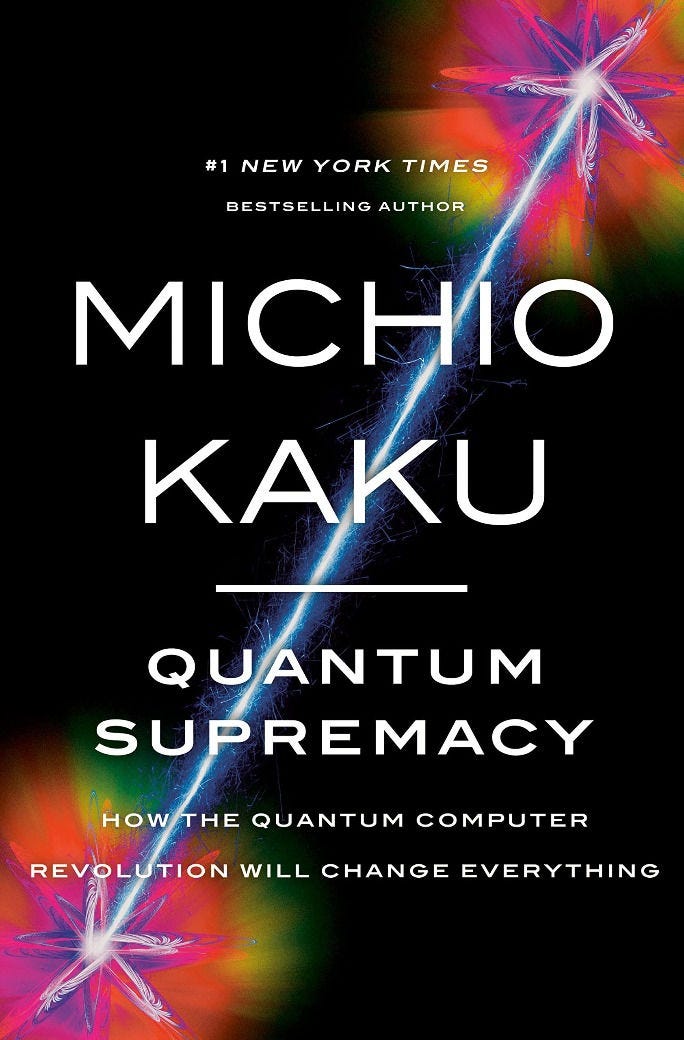Kiko Bites Newsletter dives into Professor Michio Kaku new book Quantum Supremacy: How the Quantum Computer Revolution Will Change Everything.

In "Quantum Supremacy", celebrated theoretical physicist Michio Kaku offers an illuminating take on quantum computing, a burgeoning technology predicted to reshape society profoundly. Through its chapters, the book artfully clears the air around various quantum computing myths.
Kaku begins by laying the groundwork, touching upon fundamental concepts in computing and physics. His discussion ventures into the intricacies of quantum mechanics, spotlighting essential principles and shedding light on the origins of computing—from Charles Babbage's innovations to Alan Turing's revolutionary ideas.
Michio's gift lies in crafting relatable metaphors to simplify complex quantum ideas. He compares classical computing to multiple accountants working in silos, while likening quantum computing to a synchronized team of accountants, sharing insights through the phenomenon of entanglement. Another analogy draws a parallel between electron orbits and the structured filling of rooms in a hotel.
While the book keenly delves into possible quantum computing applications, it occasionally borders on the sensational, suggesting uses like revolutionizing culinary science through precise ingredient combination predictions.
The applications discussed span a wide range, and readers might have benefited from a clearer categorization. The initial set focuses on fields where computing isn't the main hindrance, such as asteroid tracking and neural networks. The next delves into areas where quantum leaps might not drastically expedite discoveries due to the nature of the problems—like large genomic database searches. The final and most riveting category zooms in on problems unsolvable with traditional computing but within quantum computing's reach. Here, Kaku's highlights the unique capability of quantum computers to simulate quantum processes, echoing Richard Feynman's famous statement. Quantum machines can best decipher many biochemical reactions, from photosynthesis to nitrogen fixation.
However, Kaku's "Quantum Supremacy" does slightly underplay some quantum computing challenges. For instance, the looming threat of quantum computers decrypting existing encryptions—a subject causing ripples in defense sectors and financial hubs. This so-called "Q-Day" phenomenon has propelled the development of advanced cryptographic standards, driven by entities like the National Institute of Standards and Technology.
Another overlooked topic is the promise of secure data transmission through quantum entanglement. In fact, the Nobel Prize in Physics 2022 was awarded to Alain Aspect, John Clauser, and Anton Zeilinger for pioneering work in this domain.
The book concludes with a speculative portrayal of 2050—a world where quantum computing has eliminated cancer, harnessed fusion energy, and made lunar travel commonplace. While such predictions might be optimistic, Kaku's work remains an insightful, well-structured guide into the enigma of quantum computing.
More about the Author: Michio Kaku is a renowned Japanese-American theoretical physicist, author, and media personality. Born in 1947, he's a professor at the City College of New York and CUNY Graduate Center. He has authored New York Times bestsellers such as "The God Equation" (2021). In 2021, he received the Sir Arthur Clarke Lifetime Achievement Award for his contributions to science and science fiction.
To our beloved readers: Dive into the quantum world with us, share your thoughts, and let's embark on this incredible journey together. What are your expectations from this technological marvel? Comment below or hit that subscribe button for more exclusive content!



